
RSS-Translator
开源、简洁、可自部署的RSS翻译器 | Translate RSS feeds into your language!
Stars: 396
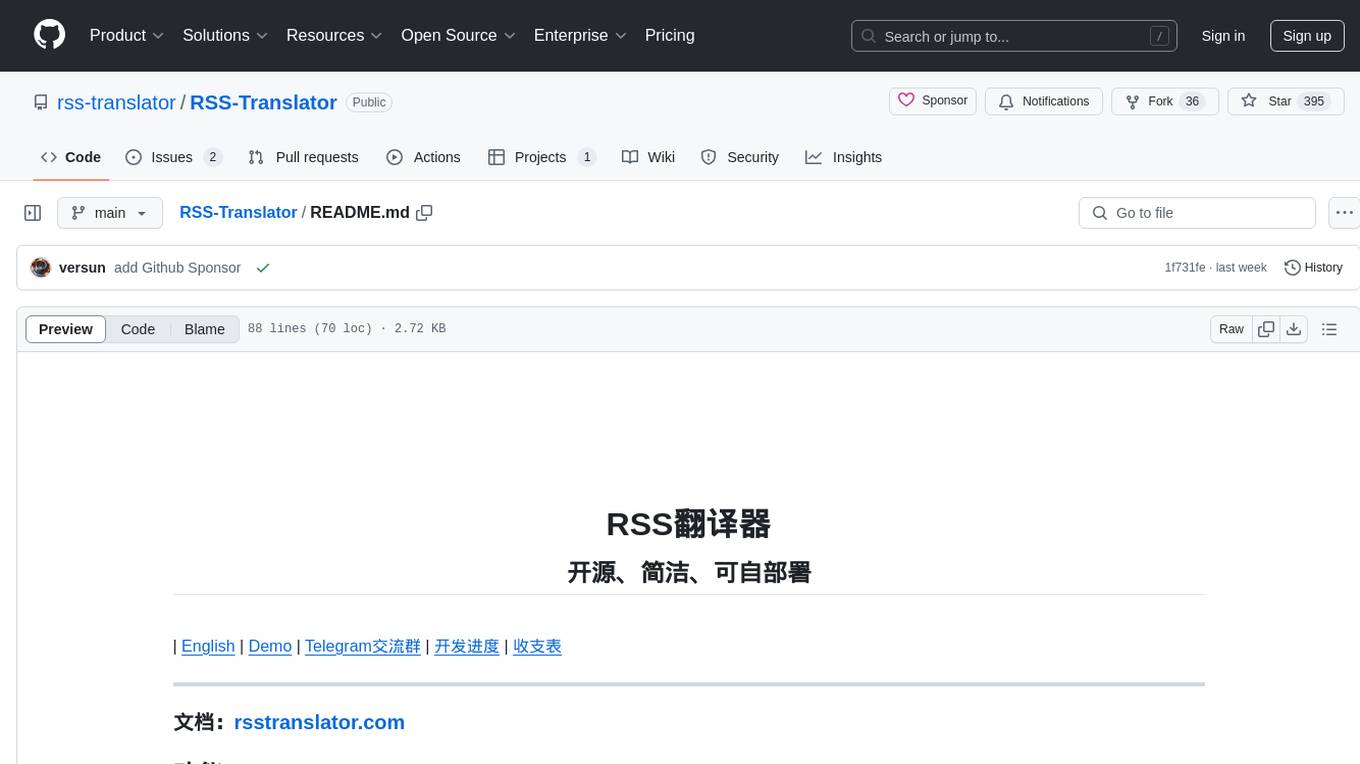
RSS-Translator is an open-source, simple, and self-deployable tool that allows users to translate titles or content, display in bilingual, subscribe to translated RSS/JSON feeds, support multiple translation engines, control update frequency of translation sources, view translation status, cache all translated content to reduce translation costs, view token/character usage for each source, provide AI content summarization, and retrieve full text. It currently supports various translation engines such as Free Translators, DeepL, OpenAI, ClaudeAI, Azure OpenAI, Google Gemini, Google Translate, Microsoft Translate API, Caiyun API, Moonshot AI, Together AI, OpenRouter AI, Groq, Doubao, OpenL, and Kagi API, with more being added continuously.
README:
| English | Demo | Telegram交流群 | 开发进度 | 收支表
- 翻译标题或内容
- 双语显示
- 订阅翻译后的RSS/JSON
- 支持多种翻译引擎,每个源都可以指定一个翻译引擎
- 控制翻译源的更新频率和查看翻译状态
- 缓存所有翻译内容,尽可能减少翻译费用
- 可查看每个源所花费的Token/字符数
- AI内容总结
- 获取全文
目前支持的翻译引擎:
- Free Translators(集合了所有主流的免费翻译服务)
- DeepL
- DeepLX
- OpenAI
- ClaudeAI
- Azure OpenAI
- Google Gemini
- Google Translate(Web)
- Microsoft Translate API
- Caiyun API
- Moonshot AI
- Together AI
- OpenRouter AI
- Groq
- 豆包(Doubao)
- OpenL
- Kagi API
陆续增加中
感谢以下公司为本项目提供的开源支持。
|
|

|
|
非常感谢以下用户的支持:
如有余力,请考虑成为赞助者:爱发电 | Github Sponsor
说明: 赞助头像每天早上和下午的5:30分刷新(UTC时区)。
For Tasks:
Click tags to check more tools for each tasksFor Jobs:
Alternative AI tools for RSS-Translator
Similar Open Source Tools

RSS-Translator
RSS-Translator is an open-source, simple, and self-deployable tool that allows users to translate titles or content, display in bilingual, subscribe to translated RSS/JSON feeds, support multiple translation engines, control update frequency of translation sources, view translation status, cache all translated content to reduce translation costs, view token/character usage for each source, provide AI content summarization, and retrieve full text. It currently supports various translation engines such as Free Translators, DeepL, OpenAI, ClaudeAI, Azure OpenAI, Google Gemini, Google Translate, Microsoft Translate API, Caiyun API, Moonshot AI, Together AI, OpenRouter AI, Groq, Doubao, OpenL, and Kagi API, with more being added continuously.
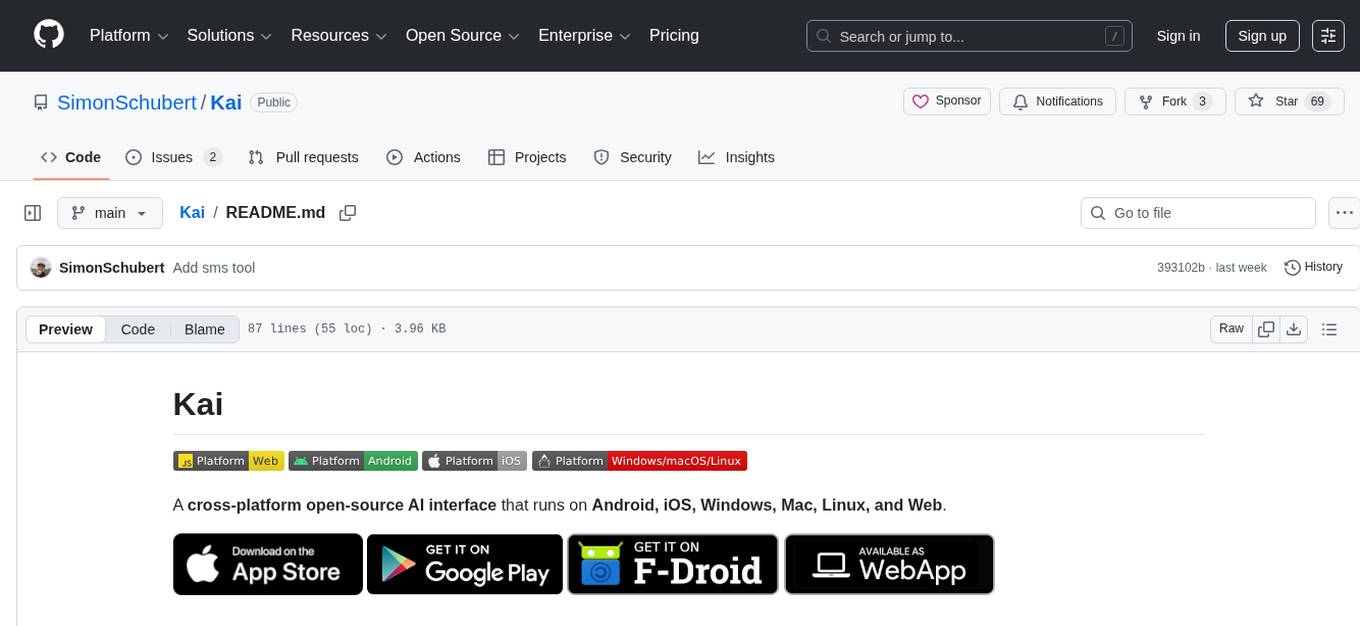
Kai
Kai is a cross-platform open-source AI interface that runs on Android, iOS, Windows, Mac, Linux, and Web. It supports encrypted local history storage, text to speech output, seamless switch between services, and file attachments. Users can enable or disable tools like Get Local Time, Get Location, Send Notification, Create Calendar Event, Check Recent SMS, and Send SMS. The tool is designed to provide various AI services and features for different platforms.
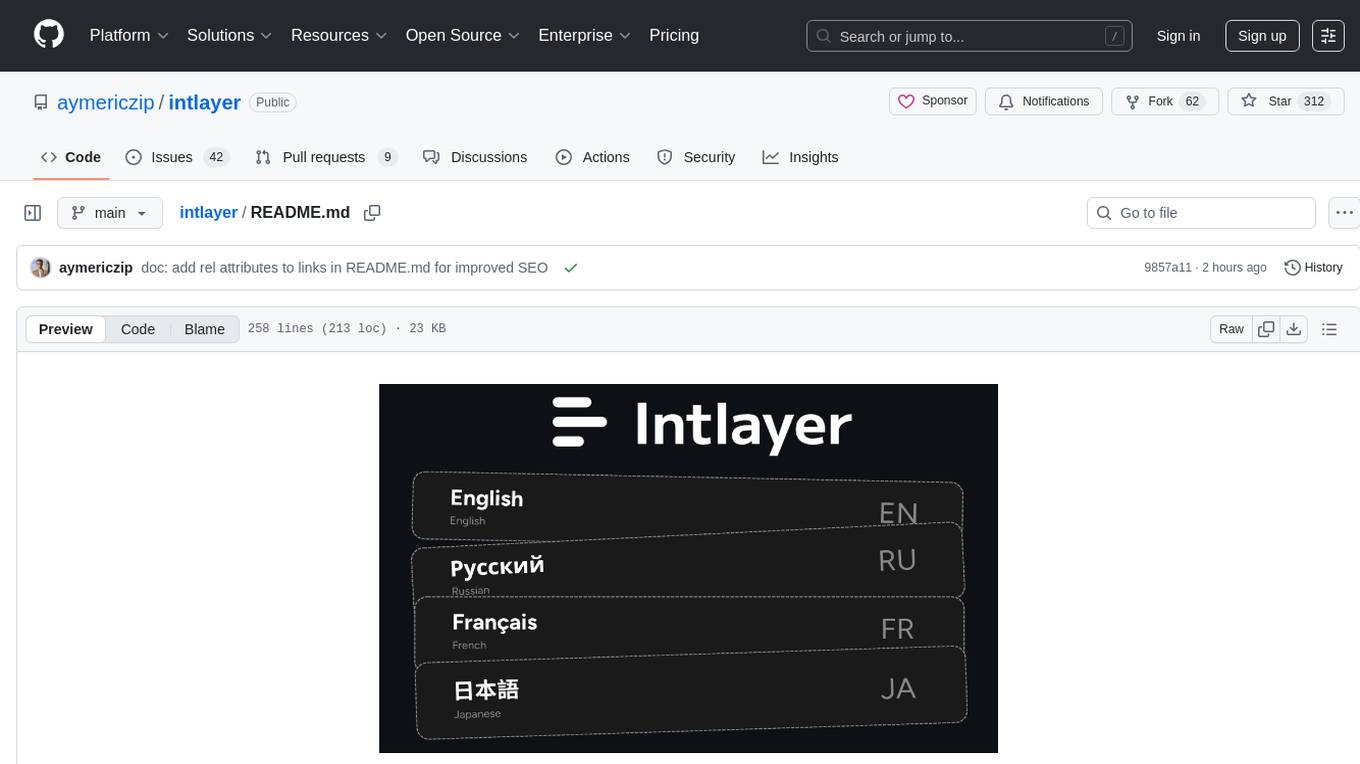
intlayer
Intlayer is an open-source, flexible i18n toolkit with AI-powered translation and CMS capabilities. It is a modern i18n solution for web and mobile apps, framework-agnostic, and includes features like per-locale content files, TypeScript autocompletion, tree-shakable dictionaries, and CI/CD integration. With Intlayer, internationalization becomes faster, cleaner, and smarter, offering benefits such as cross-framework support, JavaScript-powered content management, simplified setup, enhanced routing, AI-powered translation, and more.
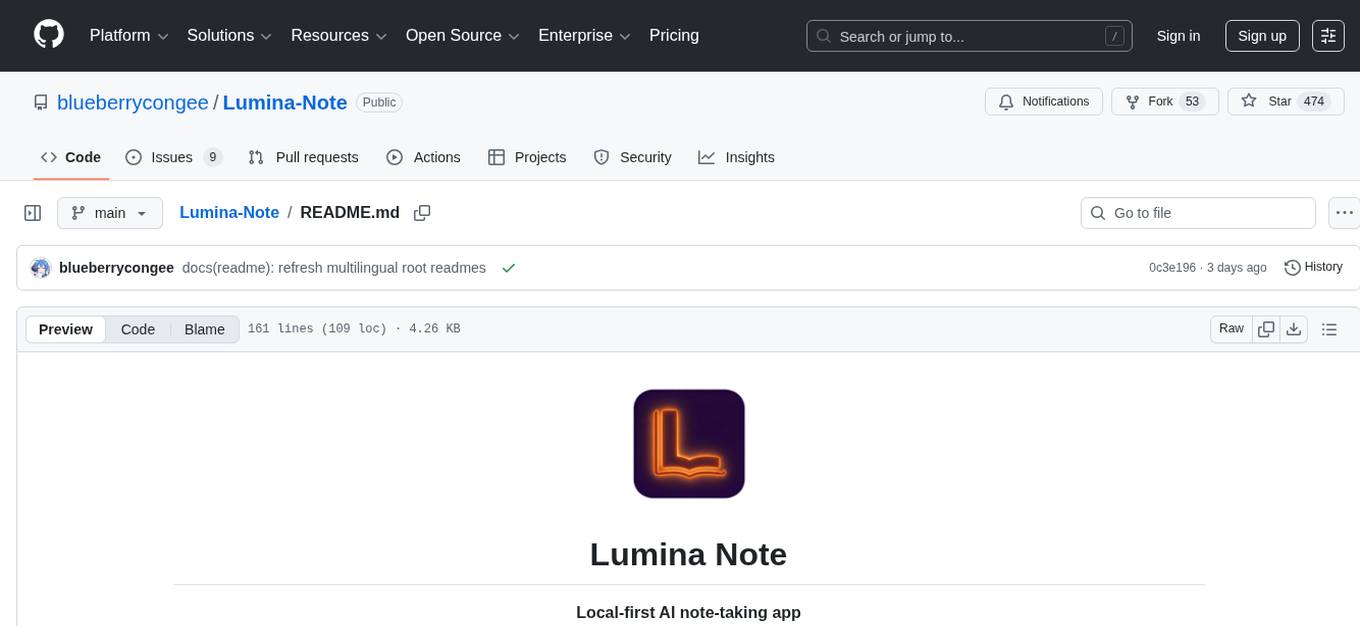
Lumina-Note
Lumina Note is a local-first AI note-taking app designed to help users write, connect, and evolve knowledge with AI capabilities while ensuring data ownership. It offers a knowledge-centered workflow with features like Markdown editor, WikiLinks, and graph view. The app includes AI workspace modes such as Chat, Agent, Deep Research, and Codex, along with support for multiple model providers. Users can benefit from bidirectional links, LaTeX support, graph visualization, PDF reader with annotations, real-time voice input, and plugin ecosystem for extended functionalities. Lumina Note is built on Tauri v2 framework with a tech stack including React 18, TypeScript, Tailwind CSS, and SQLite for vector storage.
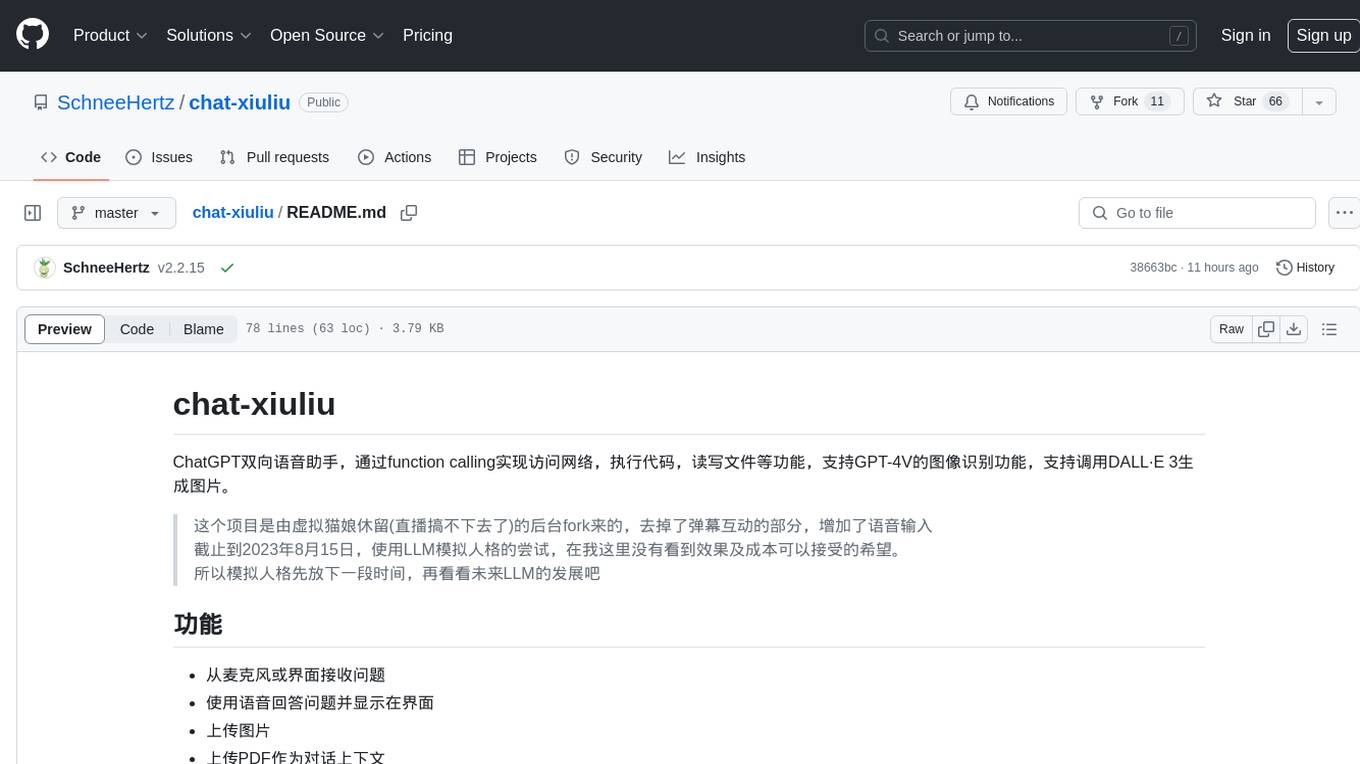
chat-xiuliu
Chat-xiuliu is a bidirectional voice assistant powered by ChatGPT, capable of accessing the internet, executing code, reading/writing files, and supporting GPT-4V's image recognition feature. It can also call DALL·E 3 to generate images. The project is a fork from a background of a virtual cat girl named Xiuliu, with removed live chat interaction and added voice input. It can receive questions from microphone or interface, answer them vocally, upload images and PDFs, process tasks through function calls, remember conversation content, search the web, generate images using DALL·E 3, read/write local files, execute JavaScript code in a sandbox, open local files or web pages, customize the cat girl's speaking style, save conversation screenshots, and support Azure OpenAI and other API endpoints in openai format. It also supports setting proxies and various AI models like GPT-4, GPT-3.5, and DALL·E 3.
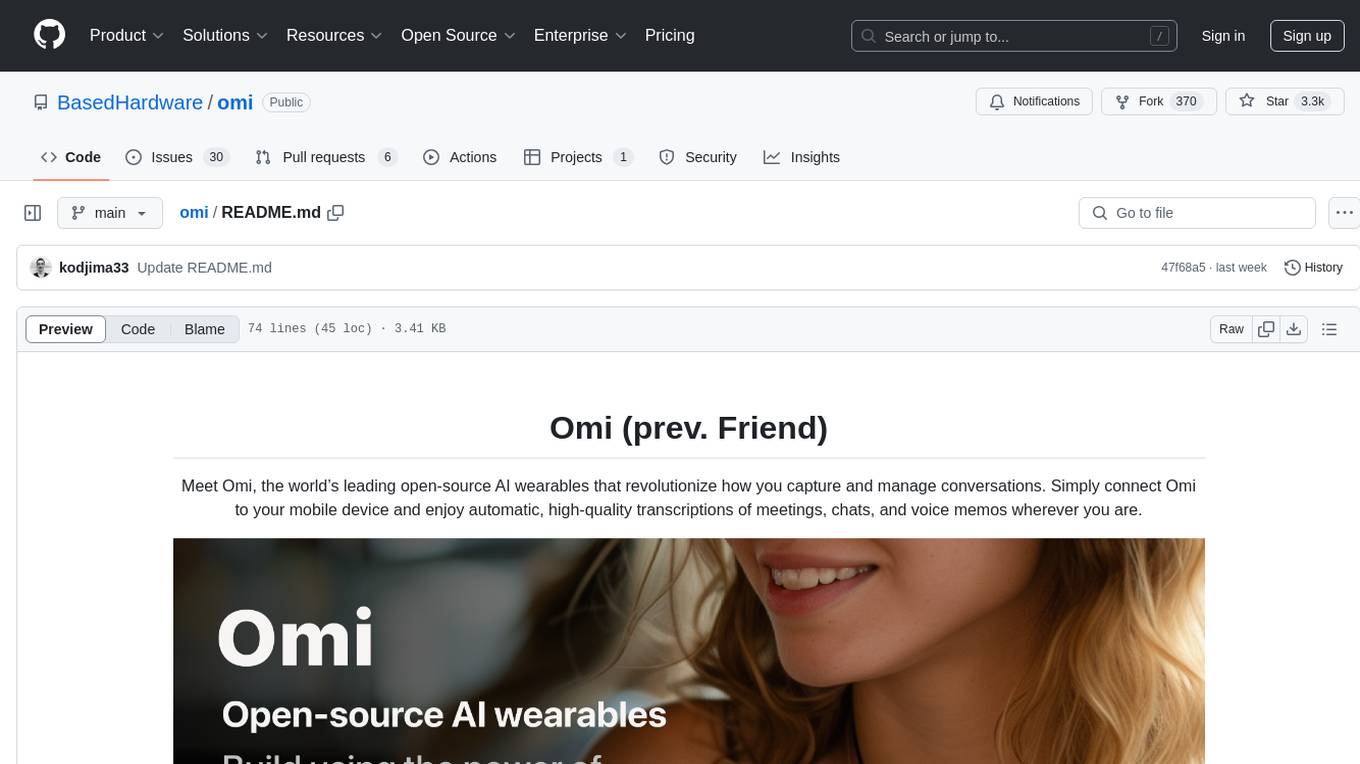
omi
Omi is an open-source AI wearable that provides automatic, high-quality transcriptions of meetings, chats, and voice memos. It revolutionizes how conversations are captured and managed by connecting to mobile devices. The tool offers features for seamless documentation and integration with third-party services.
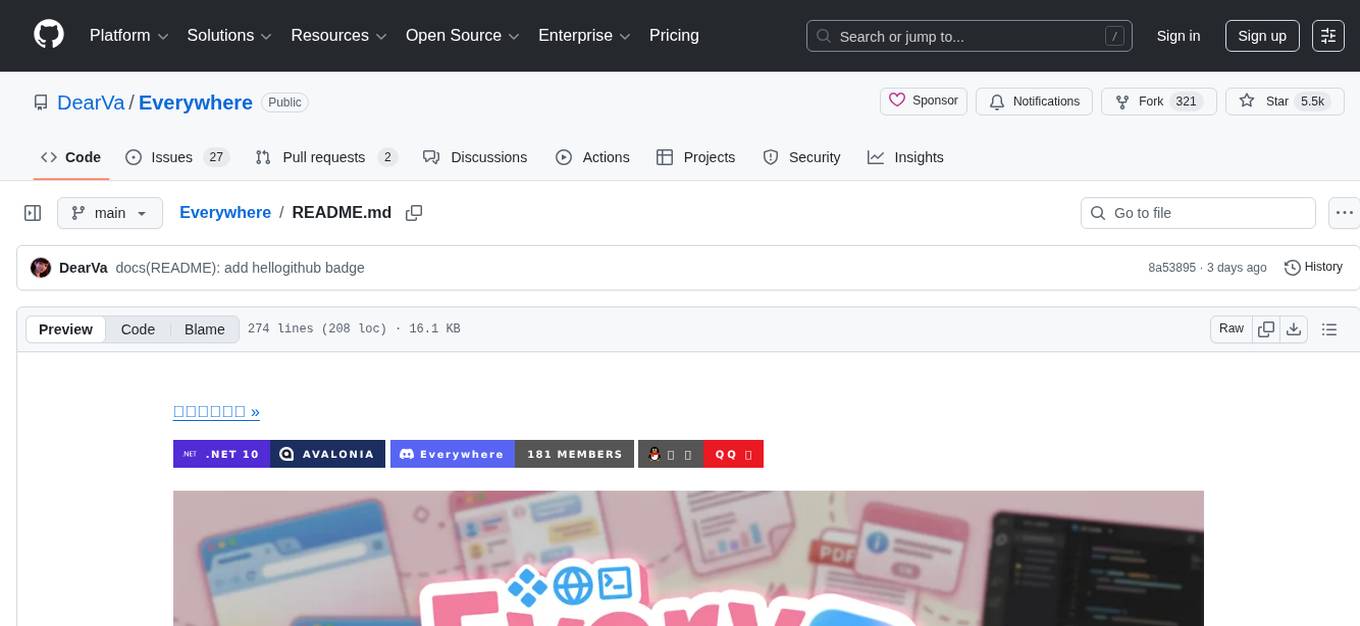
Everywhere
Everywhere is an interactive AI assistant with context-aware capabilities, featuring a sleek, modern UI and powerful integrated functionality. It instantly perceives and understands anything on your screen, providing seamless AI assistant support without the need for screenshots or app switching. The tool offers troubleshooting expertise, quick web summarization, instant translation, and email draft assistance. It supports LLM from various providers, integrates with web browsers, file systems, terminals, and more, and provides an interactive experience with a modern UI, context-aware invocation, keyboard shortcuts, and markdown rendering. Everywhere is available on Windows and macOS, with Linux support coming soon. Language support includes Simplified Chinese, English, German, Spanish, French, Italian, Japanese, Korean, Russian, Turkish, Traditional Chinese, and Traditional Chinese (Hong Kong).
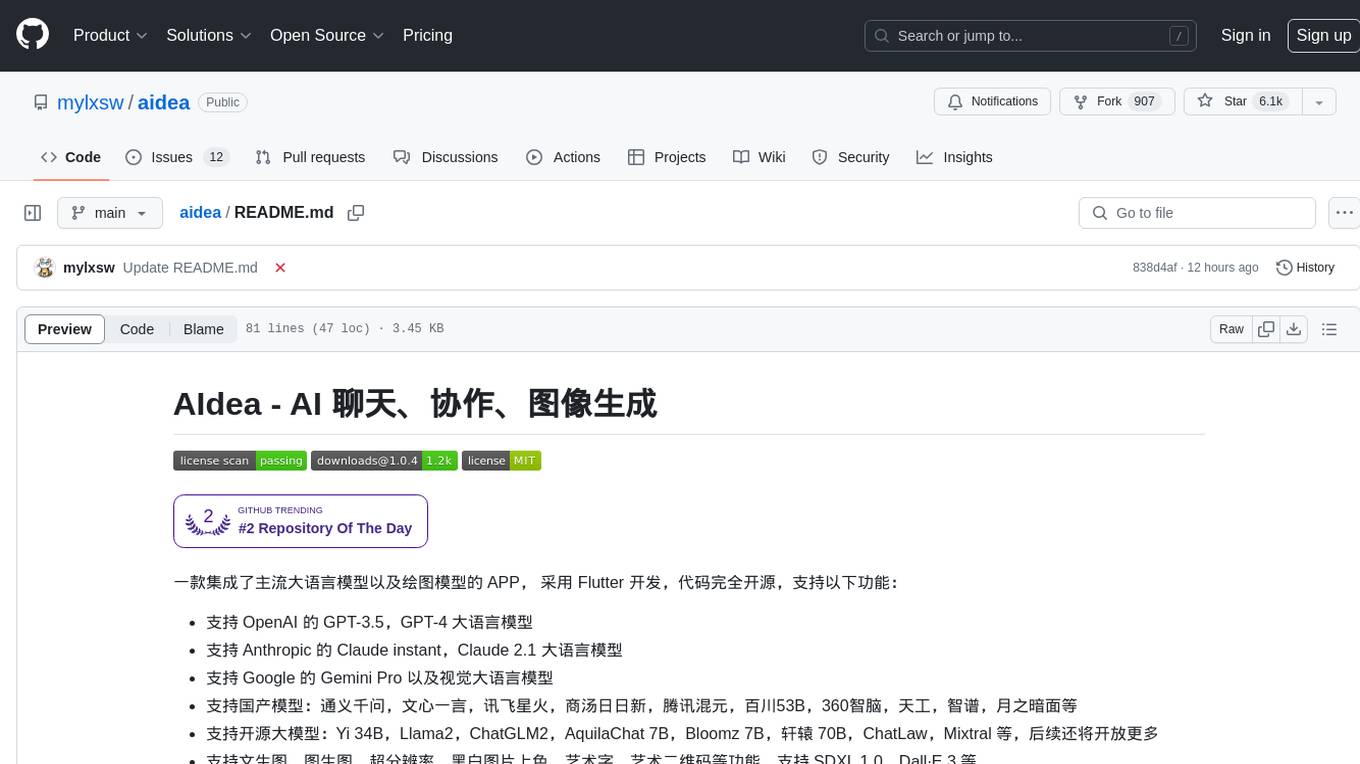
aidea
AIdea is an app that integrates mainstream large language models and drawing models, developed using Flutter. The code is completely open-source and supports various functions such as GPT-3.5, GPT-4 from OpenAI, Claude instant, Claude 2.1 from Anthropic, Gemini Pro and visual language models from Google, as well as various Chinese and open-source models. It also supports features like text-to-image, super-resolution, coloring black and white images, artistic fonts, artistic QR codes, and more.
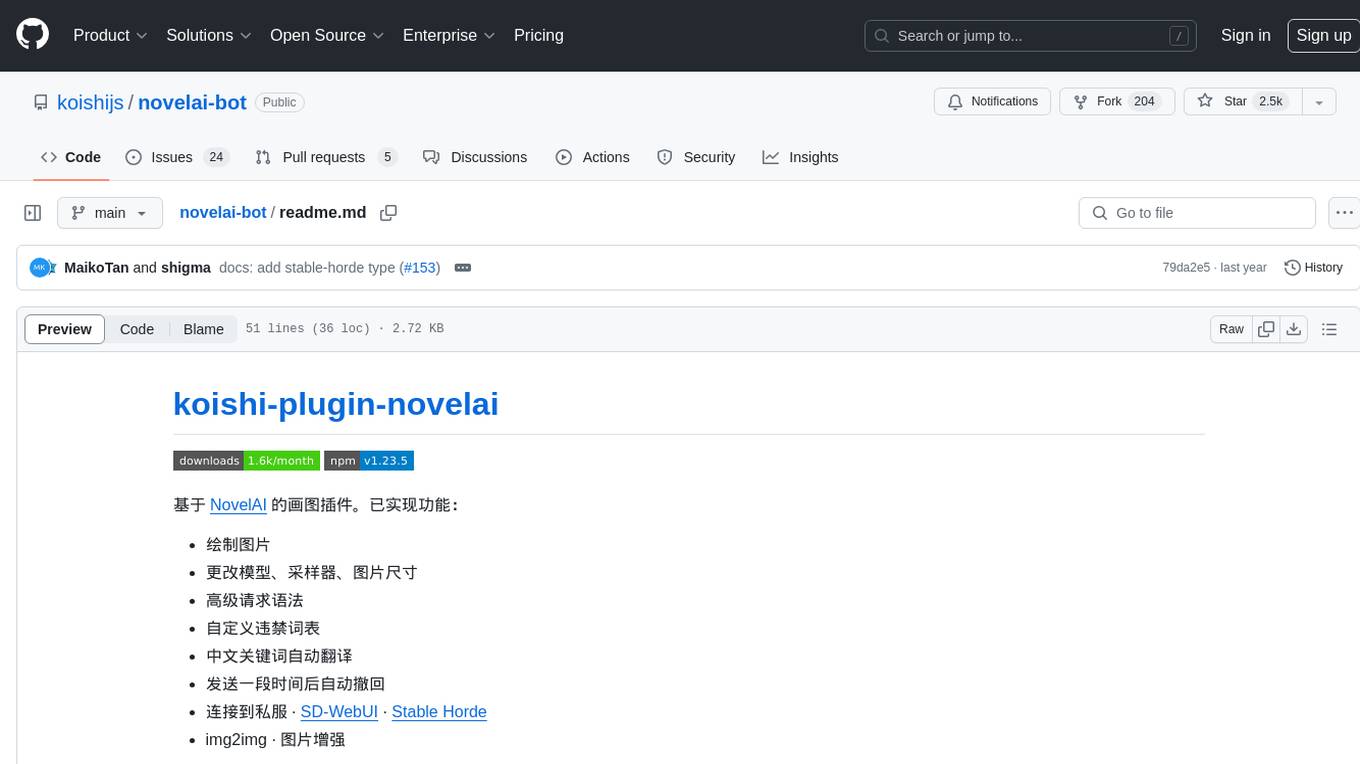
novelai-bot
This repository contains a drawing plugin based on NovelAI. It allows users to draw images, change models, samplers, and image sizes, use advanced request syntax, customize prohibited word lists, automatically translate Chinese keywords, automatically retract messages after a certain time, and connect to private servers. Thanks to Koishi's plugin mechanism, users can achieve more functionalities by combining it with other plugins, such as multi-platform support, rate limiting, context management, and multi-language support.
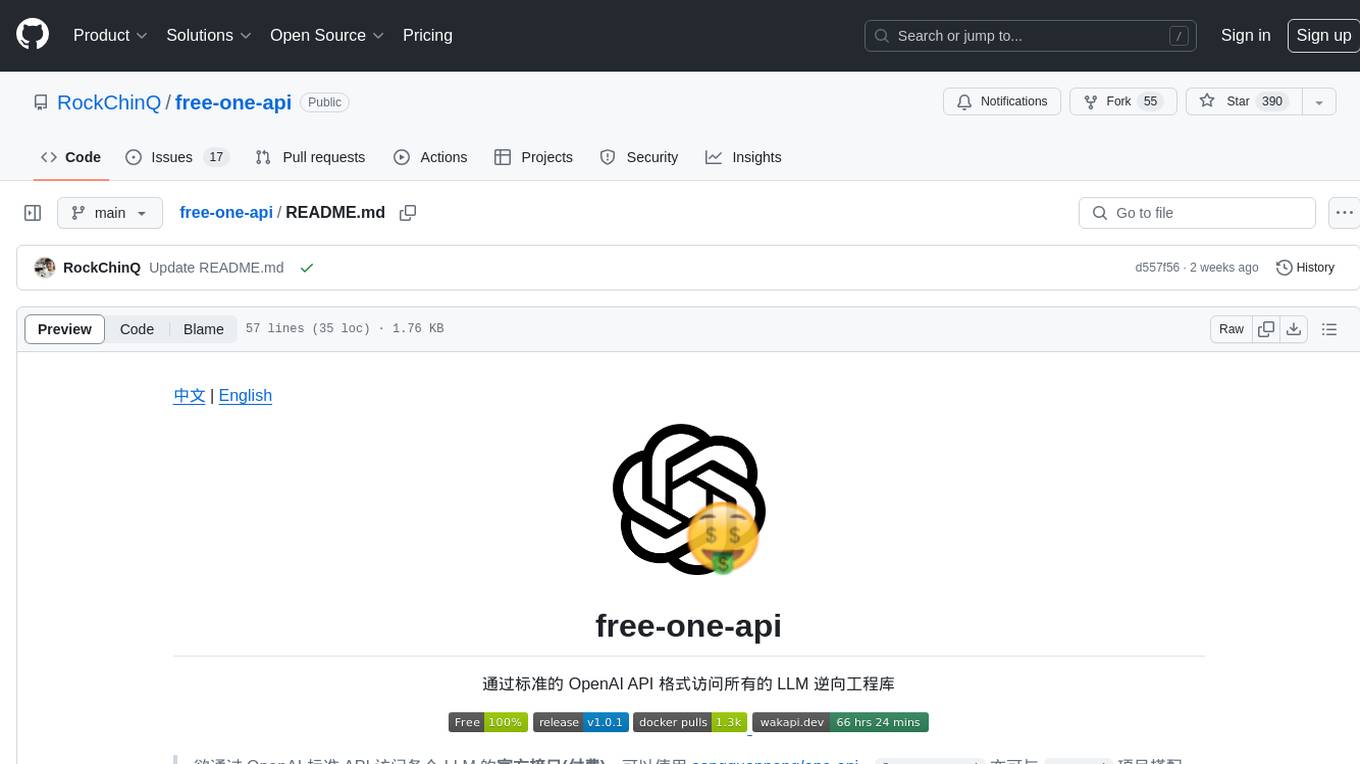
free-one-api
Free-one-api is a tool that allows access to all LLM reverse engineering libraries in a standard OpenAI API format. It supports automatic load balancing, Web UI, stream mode, multiple LLM reverse libraries, heartbeat detection mechanism, automatic disabling of unavailable channels, and runtime log recording. The tool is designed to work with the 'one-api' project and 'songquanpeng/one-api' for accessing official interfaces of various LLMs (paid). Contributors are needed to test adapters, find new reverse engineering libraries, and submit PRs.
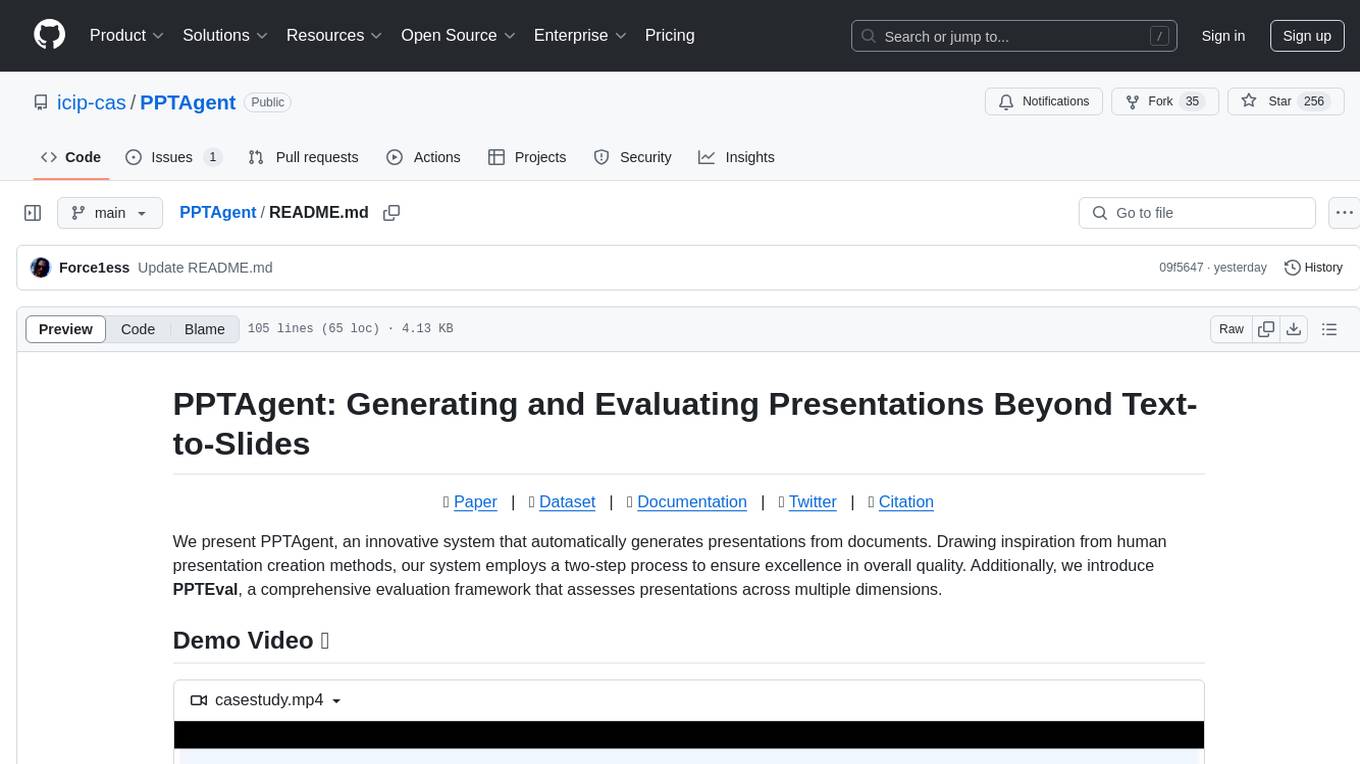
PPTAgent
PPTAgent is an innovative system that automatically generates presentations from documents. It employs a two-step process for quality assurance and introduces PPTEval for comprehensive evaluation. With dynamic content generation, smart reference learning, and quality assessment, PPTAgent aims to streamline presentation creation. The tool follows an analysis phase to learn from reference presentations and a generation phase to develop structured outlines and cohesive slides. PPTEval evaluates presentations based on content accuracy, visual appeal, and logical coherence.
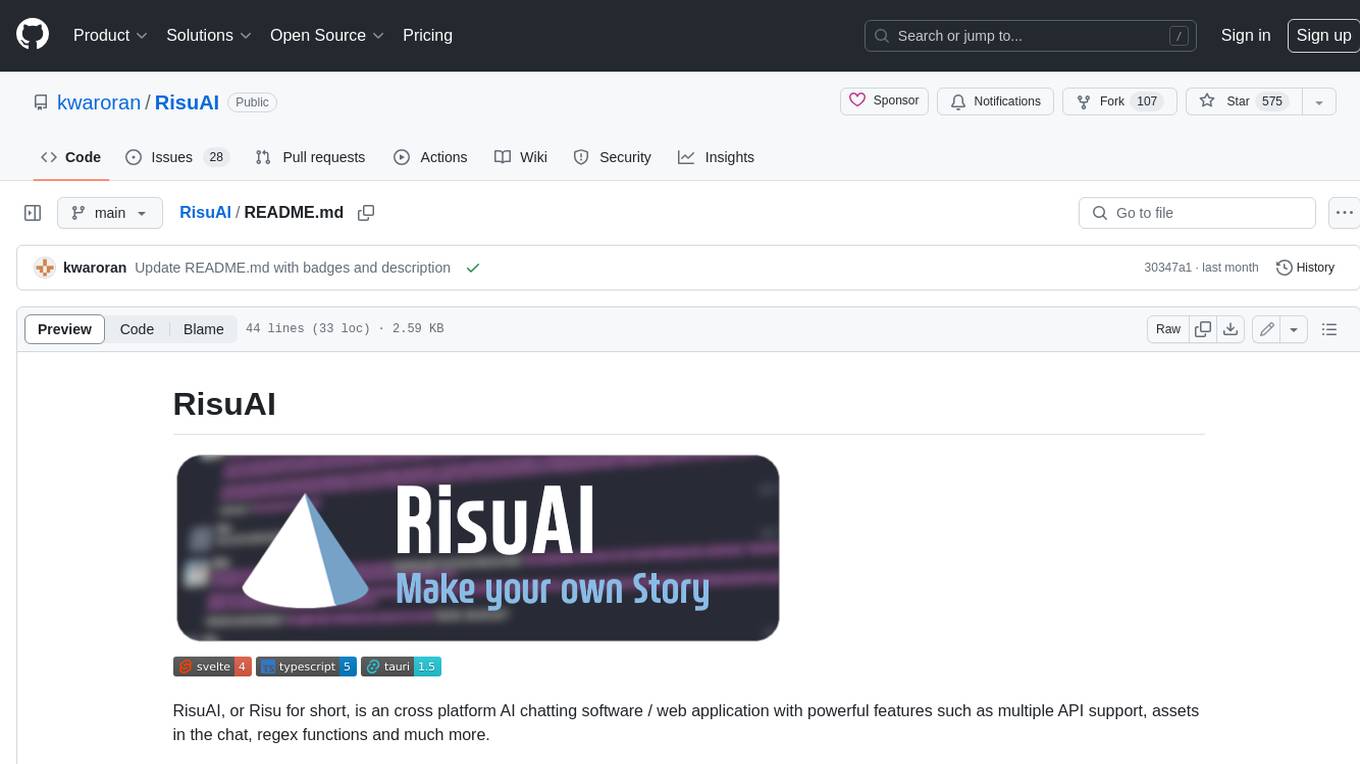
RisuAI
RisuAI, or Risu for short, is a cross-platform AI chatting software/web application with powerful features such as multiple API support, assets in the chat, regex functions, and much more.
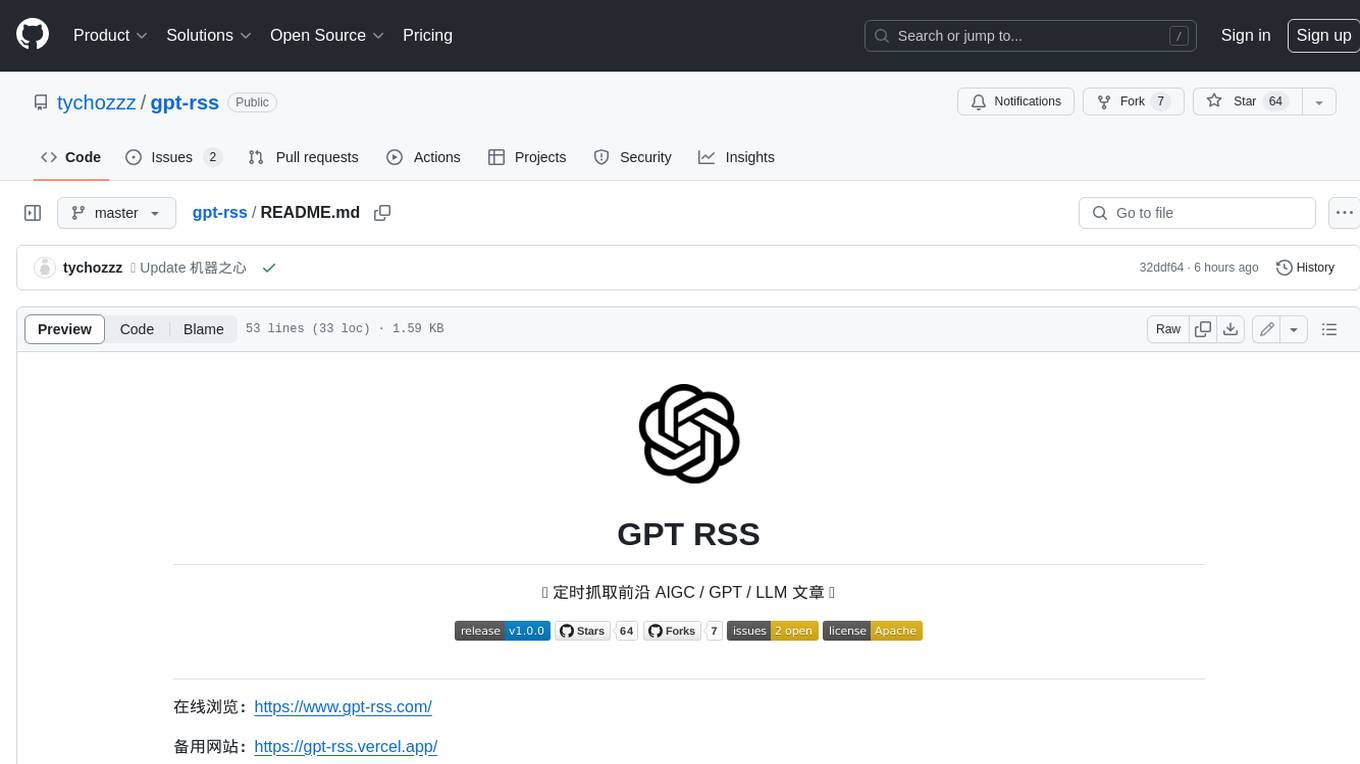
gpt-rss
GPT RSS is a tool that allows users to stay up-to-date on the latest AIGC/GPT/LLM articles by定时抓取前沿 AIGC / GPT / LLM 文章. It features a user-friendly interface that supports PC and mobile devices, as well as search and filter functions. GPT RSS is built using Vue3 and Vant UI component library, and utilizes Node.js for定时任务 to update articles daily.
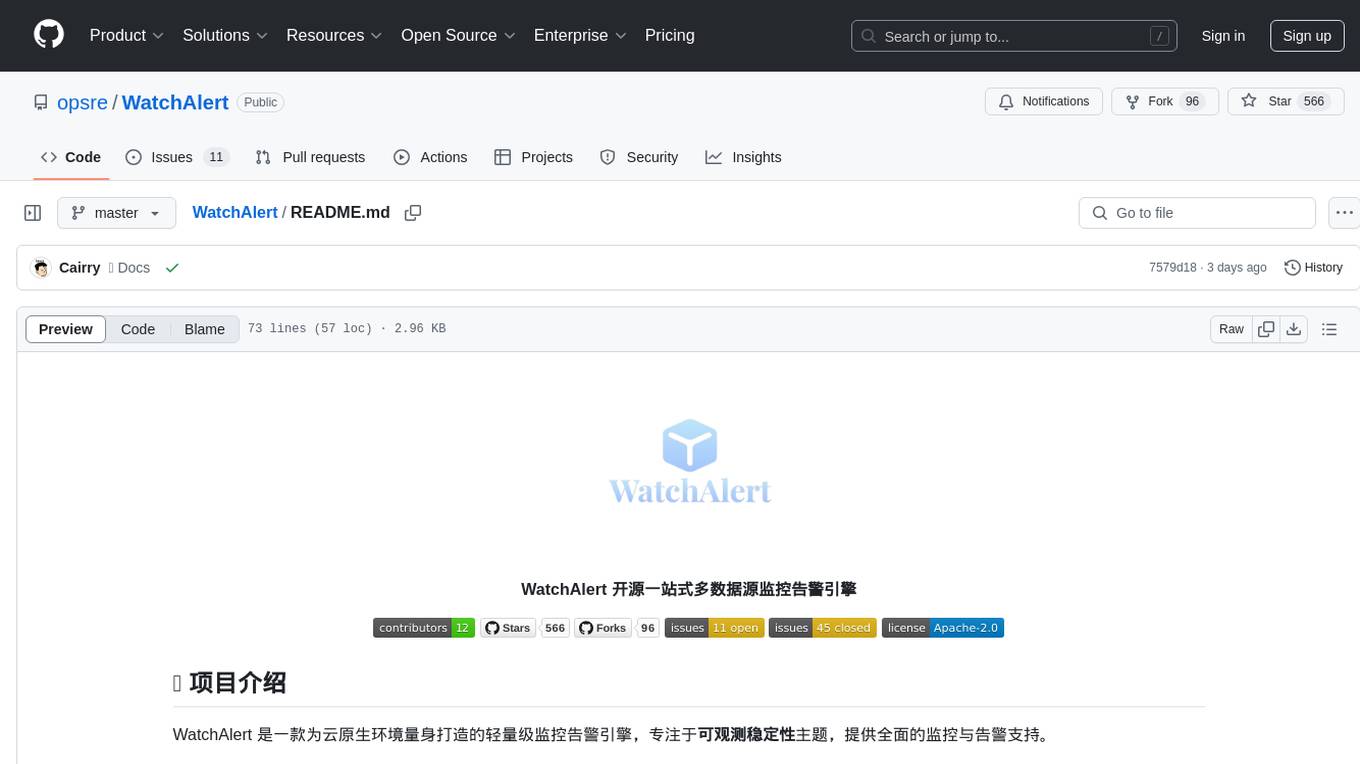
WatchAlert
WatchAlert is a lightweight monitoring and alerting engine tailored for cloud-native environments, focusing on observability and stability themes. It provides comprehensive monitoring and alerting support, including AI-powered alert analysis for efficient troubleshooting. WatchAlert integrates with various data sources such as Prometheus, VictoriaMetrics, Loki, Elasticsearch, AliCloud SLS, Jaeger, Kubernetes, and different network protocols for monitoring and supports alert notifications via multiple channels like Feishu, DingTalk, WeChat Work, email, and custom hooks. It is optimized for cloud-native environments, easy to use, offers flexible alert rule configurations, and specializes in stability scenarios to help users quickly identify and resolve issues, providing a reliable monitoring and alerting solution to enhance operational efficiency and reduce maintenance costs.
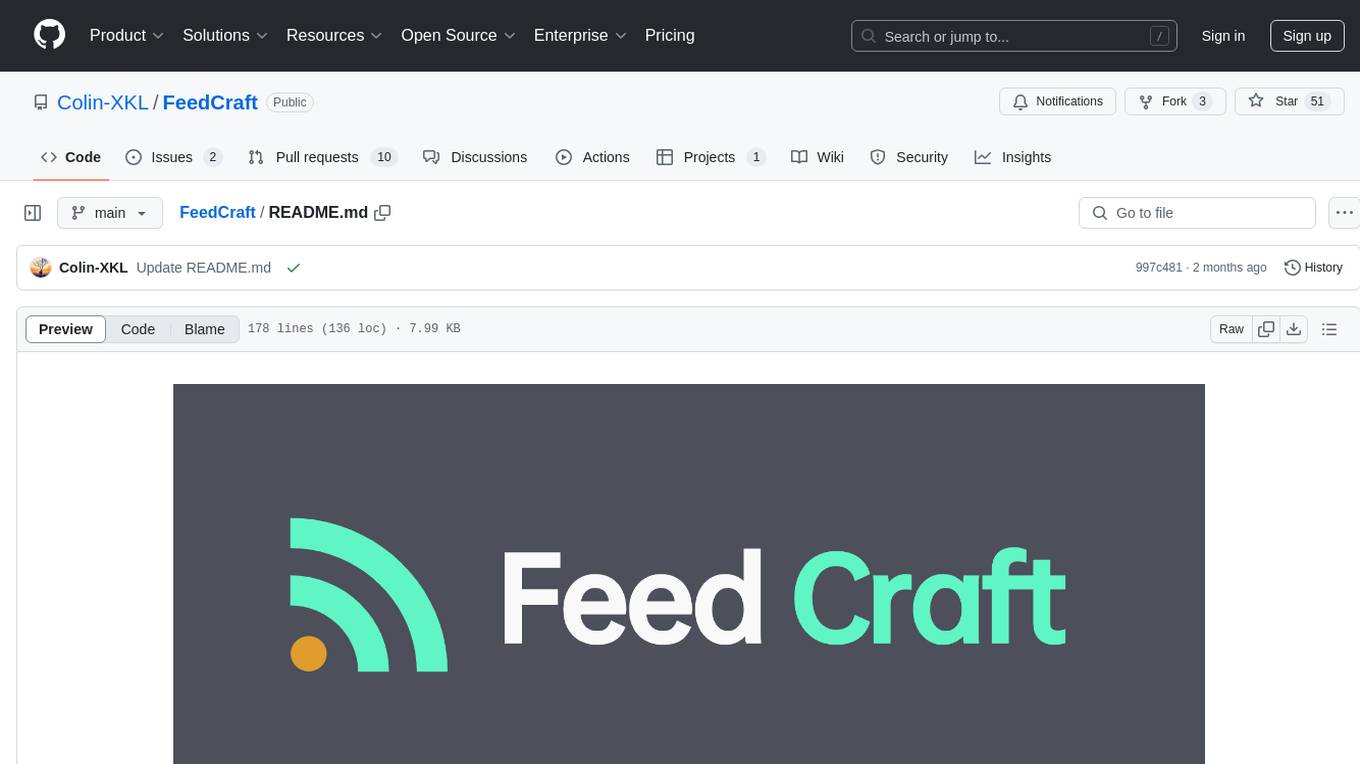
FeedCraft
FeedCraft is a powerful tool to process your rss feeds as a middleware. Use it to translate your feed, extract fulltext, emulate browser to render js-heavy page, use llm such as google gemini to generate brief for your rss article, use natural language to filter your rss feed, and more! It is an open-source tool that can be self-deployed and used with any RSS reader. It supports AI-powered processing using Open AI compatible LLMs, custom prompt, saving rules to apply to different RSS sources, portable mode for on-the-go usage, and dock mode for advanced customization of RSS sources and processing parameters.
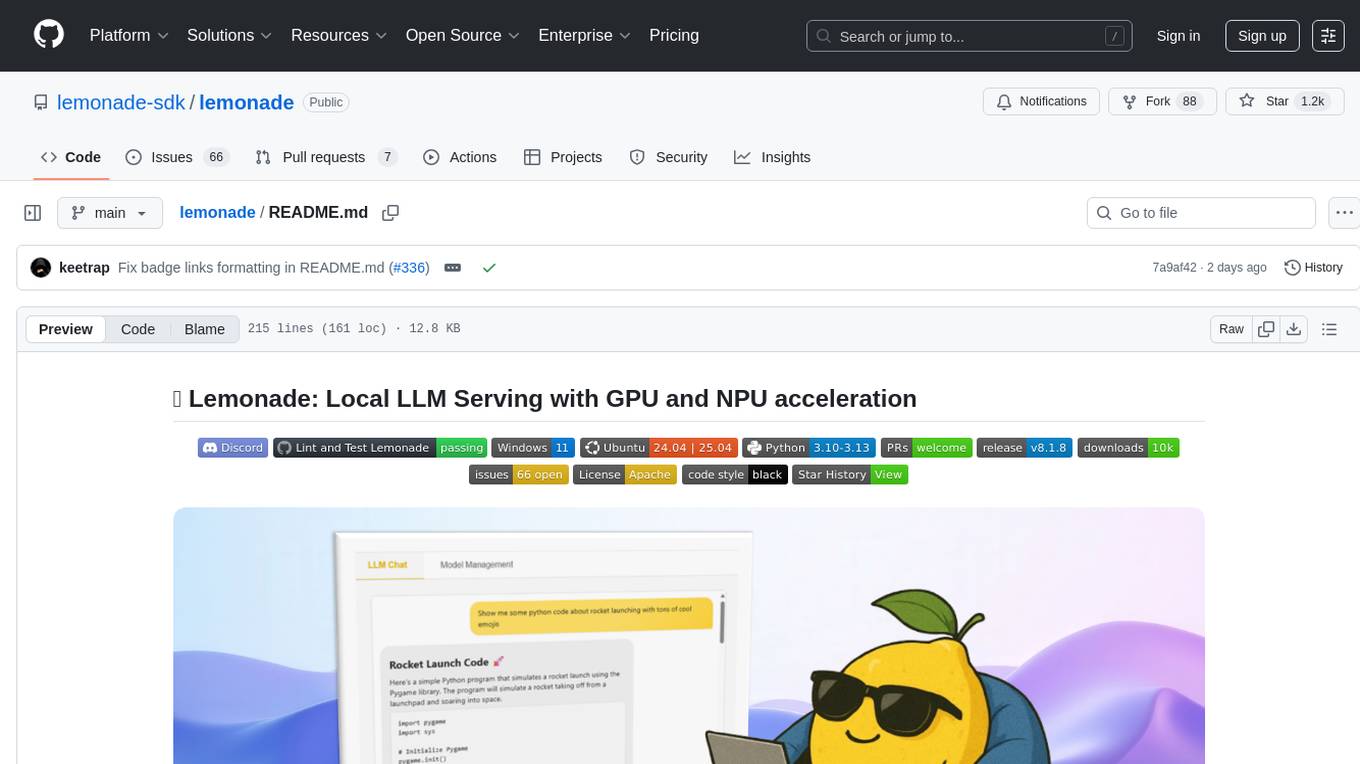
lemonade
Lemonade is a tool that helps users run local Large Language Models (LLMs) with high performance by configuring state-of-the-art inference engines for their Neural Processing Units (NPUs) and Graphics Processing Units (GPUs). It is used by startups, research teams, and large companies to run LLMs efficiently. Lemonade provides a high-level Python API for direct integration of LLMs into Python applications and a CLI for mixing and matching LLMs with various features like prompting templates, accuracy testing, performance benchmarking, and memory profiling. The tool supports both GGUF and ONNX models and allows importing custom models from Hugging Face using the Model Manager. Lemonade is designed to be easy to use and switch between different configurations at runtime, making it a versatile tool for running LLMs locally.
For similar tasks

RSS-Translator
RSS-Translator is an open-source, simple, and self-deployable tool that allows users to translate titles or content, display in bilingual, subscribe to translated RSS/JSON feeds, support multiple translation engines, control update frequency of translation sources, view translation status, cache all translated content to reduce translation costs, view token/character usage for each source, provide AI content summarization, and retrieve full text. It currently supports various translation engines such as Free Translators, DeepL, OpenAI, ClaudeAI, Azure OpenAI, Google Gemini, Google Translate, Microsoft Translate API, Caiyun API, Moonshot AI, Together AI, OpenRouter AI, Groq, Doubao, OpenL, and Kagi API, with more being added continuously.
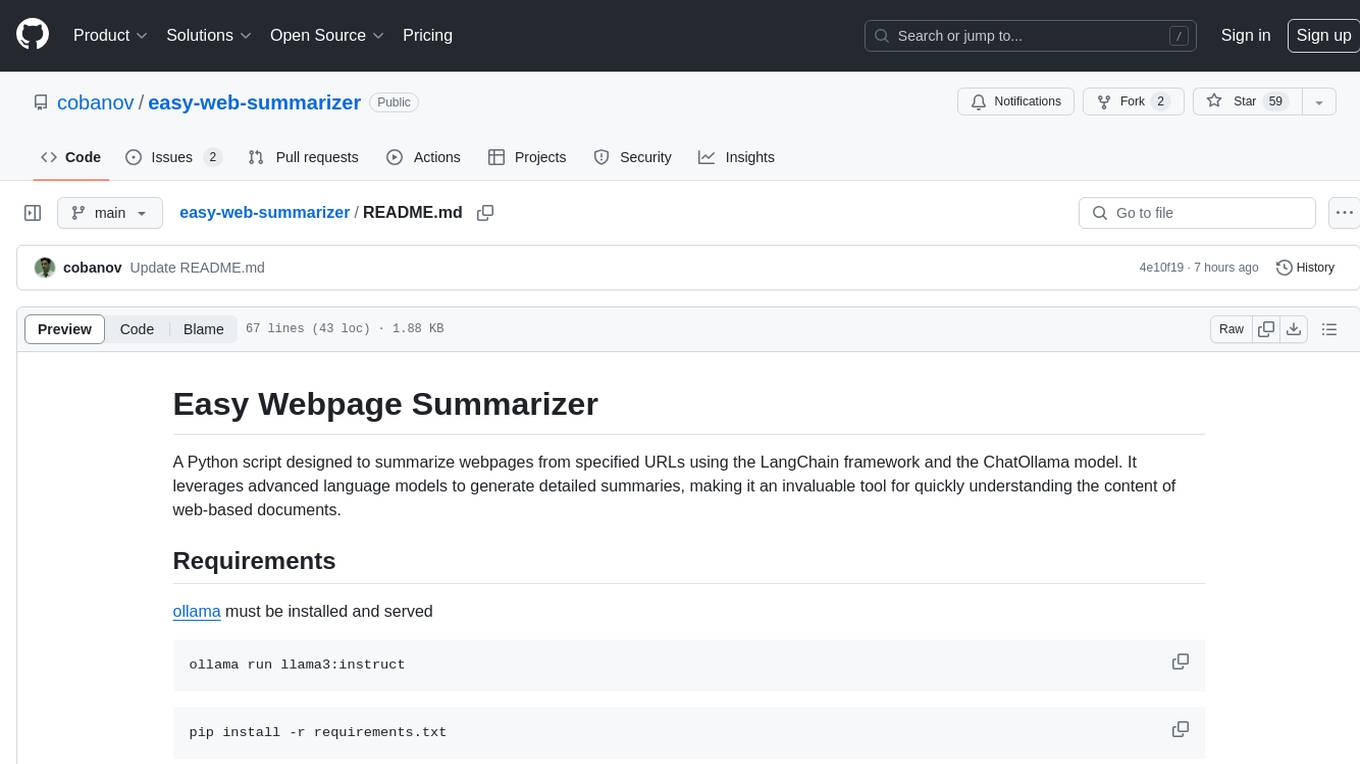
easy-web-summarizer
A Python script leveraging advanced language models to summarize webpages and youtube videos directly from URLs. It integrates with LangChain and ChatOllama for state-of-the-art summarization, providing detailed summaries for quick understanding of web-based documents. The tool offers a command-line interface for easy use and integration into workflows, with plans to add support for translating to different languages and streaming text output on gradio. It can also be used via a web UI using the gradio app. The script is dockerized for easy deployment and is open for contributions to enhance functionality and capabilities.
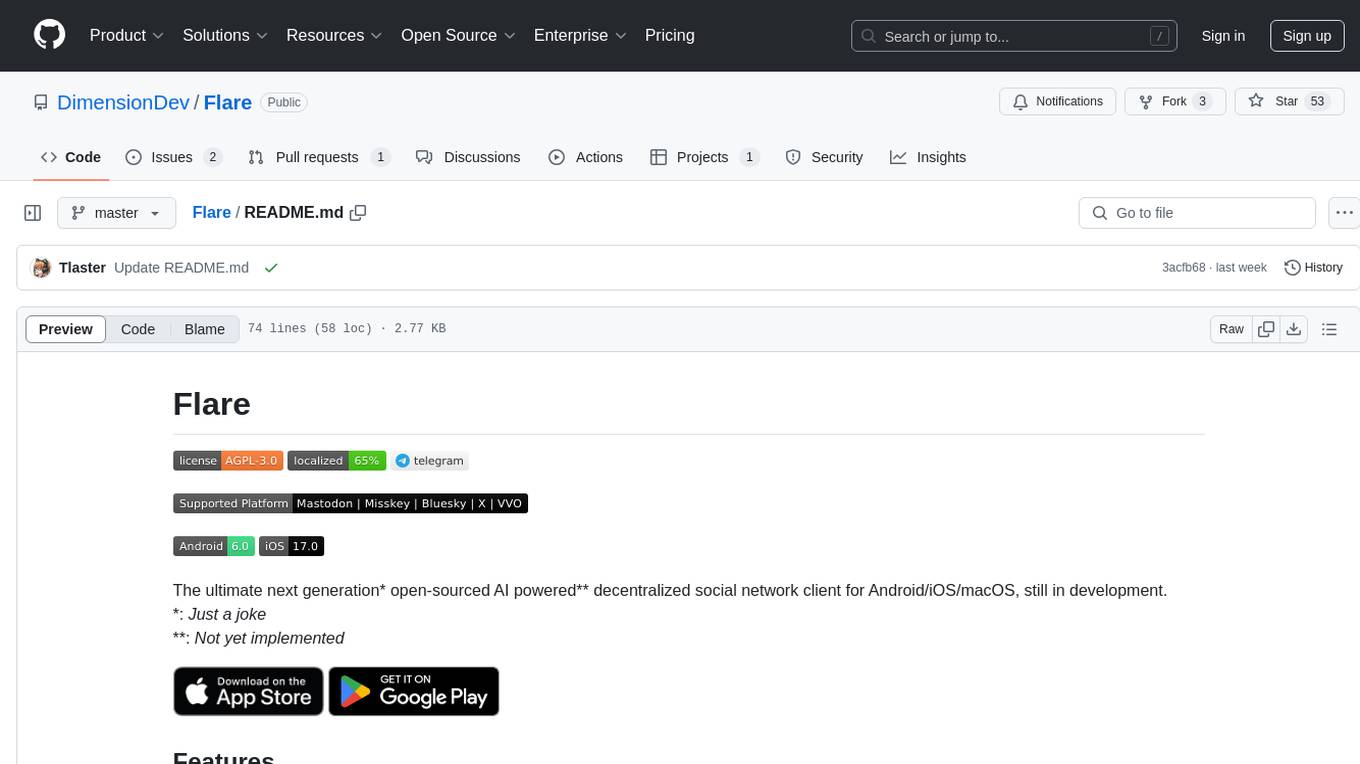
Flare
Flare is an open-source AI-powered decentralized social network client for Android/iOS/macOS, consolidating multiple social networks into one platform. It allows cross-posting content, ensures privacy, and plans to implement features like mixed timeline, AI-powered functions, and support for various platforms. The project is in active development and aims to provide a seamless social networking experience for users.
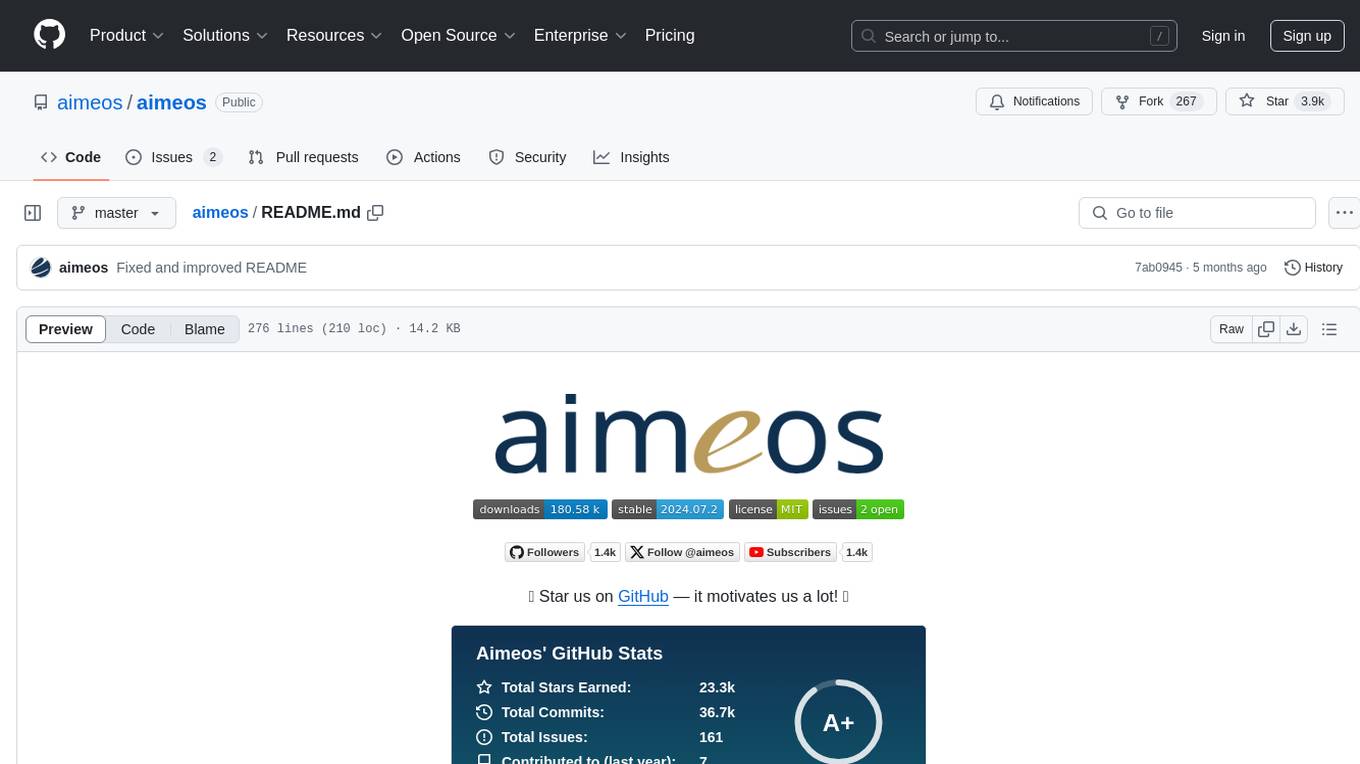
aimeos
Aimeos is a full-featured e-commerce platform that is ultra-fast, cloud-native, and API-first. It offers a wide range of features including JSON REST API, GraphQL API, multi-vendor support, various product types, subscriptions, multiple payment gateways, admin backend, modular structure, SEO optimization, multi-language support, AI-based text translation, mobile optimization, and high-quality source code. It is highly configurable and extensible, making it suitable for e-commerce SaaS solutions, marketplaces, and various cloud environments. Aimeos is designed for scalability, security, and performance, catering to a diverse range of e-commerce needs.
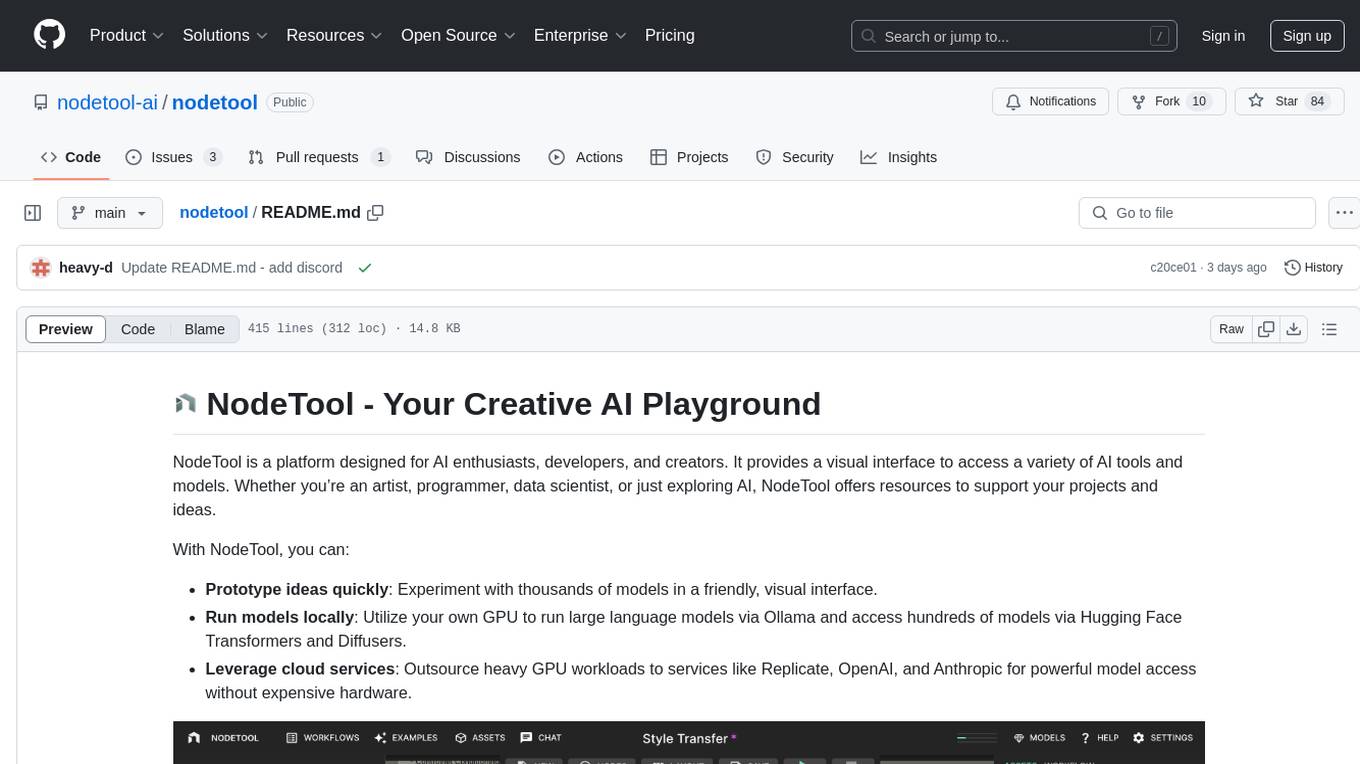
nodetool
NodeTool is a platform designed for AI enthusiasts, developers, and creators, providing a visual interface to access a variety of AI tools and models. It simplifies access to advanced AI technologies, offering resources for content creation, data analysis, automation, and more. With features like a visual editor, seamless integration with leading AI platforms, model manager, and API integration, NodeTool caters to both newcomers and experienced users in the AI field.

collections
Collections is a multilingual headless CMS with AI-powered editing and SEO optimization. It supports automatic translation into +30 languages, making websites more accessible and reaching a broader audience. The platform offers features like multilingual content, Notion-like editor, and post versioning. It is built on a tech stack consisting of PostgreSQL for the database, Node.js and Express for the backend, and React with MUI for the frontend. Collections aims to simplify the process of creating and managing multilingual websites with the help of AI technology.
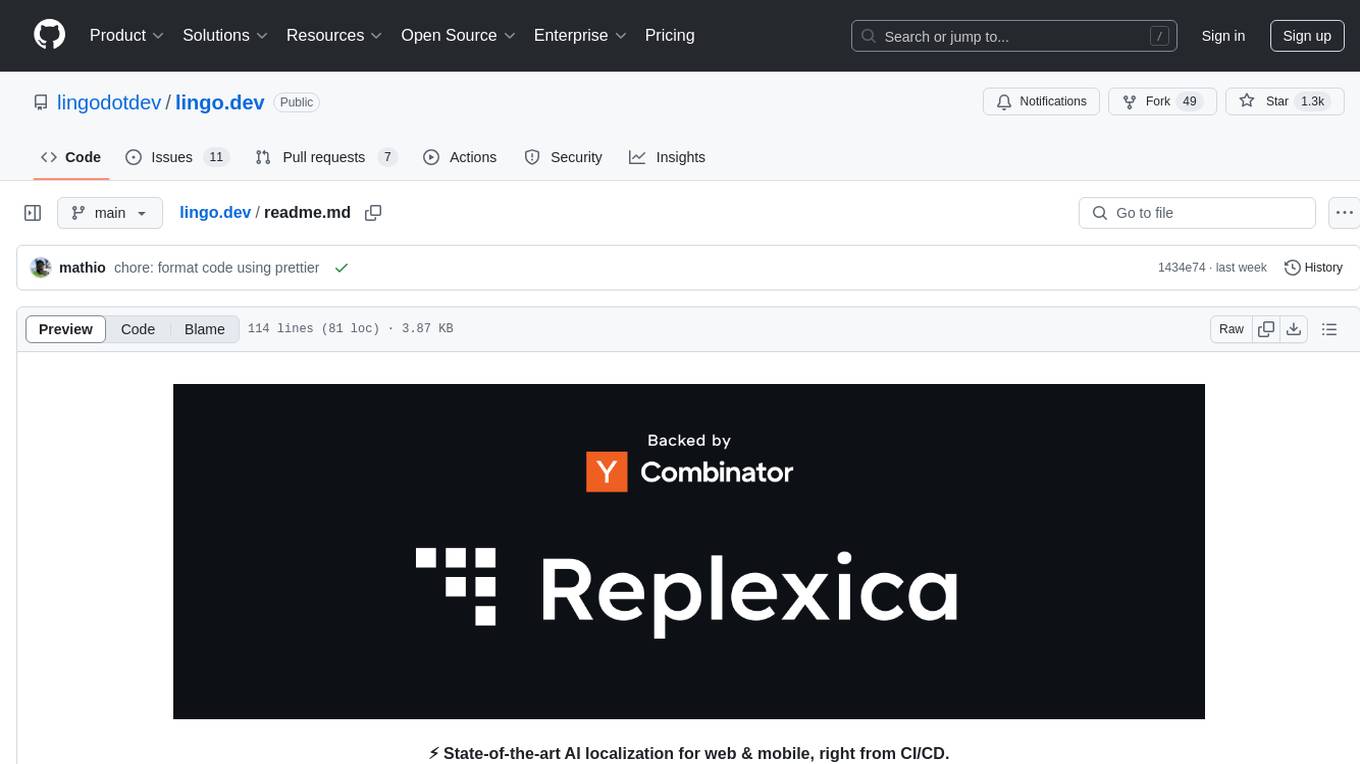
lingo.dev
Replexica AI automates software localization end-to-end, producing authentic translations instantly across 60+ languages. Teams can do localization 100x faster with state-of-the-art quality, reaching more paying customers worldwide. The tool offers a GitHub Action for CI/CD automation and supports various formats like JSON, YAML, CSV, and Markdown. With lightning-fast AI localization, auto-updates, native quality translations, developer-friendly CLI, and scalability for startups and enterprise teams, Replexica is a top choice for efficient and effective software localization.
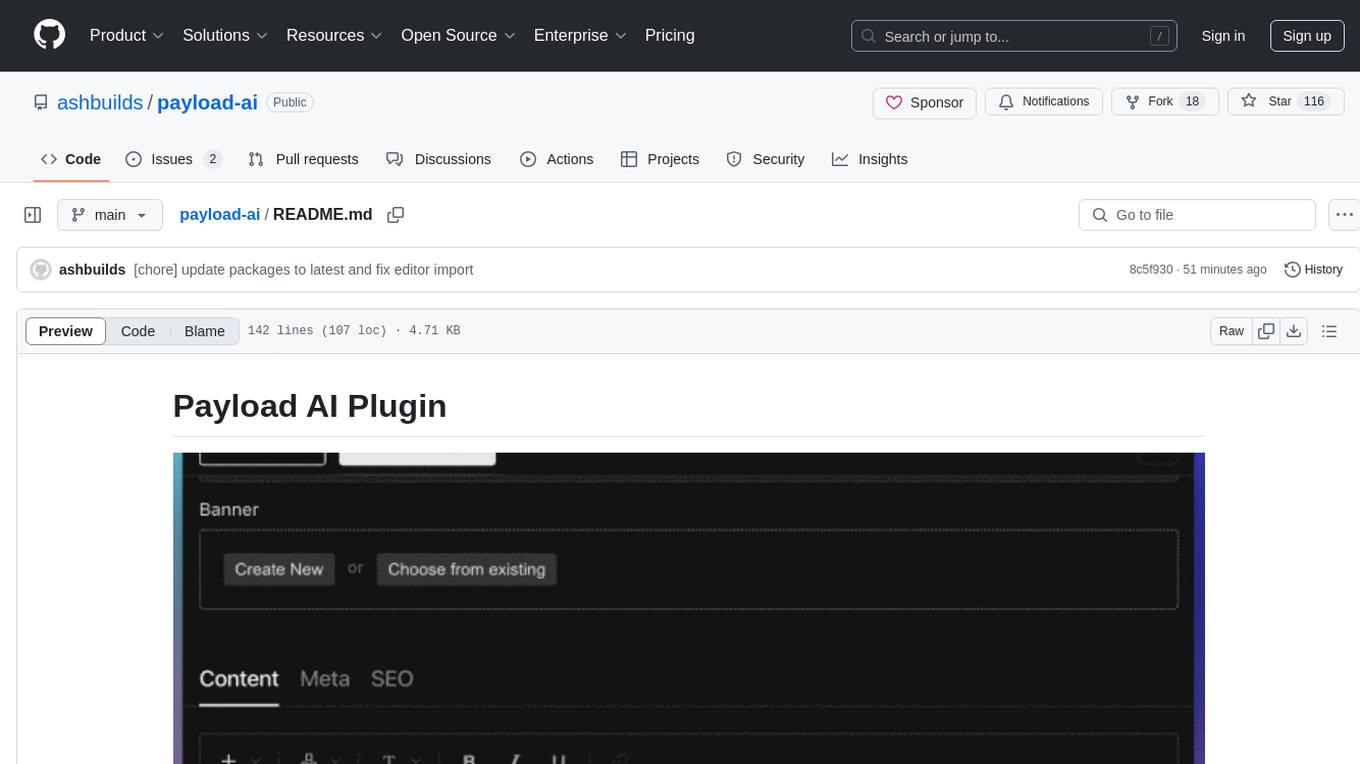
payload-ai
The Payload AI Plugin is an advanced extension that integrates modern AI capabilities into your Payload CMS, streamlining content creation and management. It offers features like text generation, voice and image generation, field-level prompt customization, prompt editor, document analyzer, fact checking, automated content workflows, internationalization support, editor AI suggestions, and AI chat support. Users can personalize and configure the plugin by setting environment variables. The plugin is actively developed and tested with Payload version v3.2.1, with regular updates expected.
For similar jobs

sweep
Sweep is an AI junior developer that turns bugs and feature requests into code changes. It automatically handles developer experience improvements like adding type hints and improving test coverage.

teams-ai
The Teams AI Library is a software development kit (SDK) that helps developers create bots that can interact with Teams and Microsoft 365 applications. It is built on top of the Bot Framework SDK and simplifies the process of developing bots that interact with Teams' artificial intelligence capabilities. The SDK is available for JavaScript/TypeScript, .NET, and Python.

ai-guide
This guide is dedicated to Large Language Models (LLMs) that you can run on your home computer. It assumes your PC is a lower-end, non-gaming setup.

classifai
Supercharge WordPress Content Workflows and Engagement with Artificial Intelligence. Tap into leading cloud-based services like OpenAI, Microsoft Azure AI, Google Gemini and IBM Watson to augment your WordPress-powered websites. Publish content faster while improving SEO performance and increasing audience engagement. ClassifAI integrates Artificial Intelligence and Machine Learning technologies to lighten your workload and eliminate tedious tasks, giving you more time to create original content that matters.

chatbot-ui
Chatbot UI is an open-source AI chat app that allows users to create and deploy their own AI chatbots. It is easy to use and can be customized to fit any need. Chatbot UI is perfect for businesses, developers, and anyone who wants to create a chatbot.

BricksLLM
BricksLLM is a cloud native AI gateway written in Go. Currently, it provides native support for OpenAI, Anthropic, Azure OpenAI and vLLM. BricksLLM aims to provide enterprise level infrastructure that can power any LLM production use cases. Here are some use cases for BricksLLM: * Set LLM usage limits for users on different pricing tiers * Track LLM usage on a per user and per organization basis * Block or redact requests containing PIIs * Improve LLM reliability with failovers, retries and caching * Distribute API keys with rate limits and cost limits for internal development/production use cases * Distribute API keys with rate limits and cost limits for students

uAgents
uAgents is a Python library developed by Fetch.ai that allows for the creation of autonomous AI agents. These agents can perform various tasks on a schedule or take action on various events. uAgents are easy to create and manage, and they are connected to a fast-growing network of other uAgents. They are also secure, with cryptographically secured messages and wallets.

griptape
Griptape is a modular Python framework for building AI-powered applications that securely connect to your enterprise data and APIs. It offers developers the ability to maintain control and flexibility at every step. Griptape's core components include Structures (Agents, Pipelines, and Workflows), Tasks, Tools, Memory (Conversation Memory, Task Memory, and Meta Memory), Drivers (Prompt and Embedding Drivers, Vector Store Drivers, Image Generation Drivers, Image Query Drivers, SQL Drivers, Web Scraper Drivers, and Conversation Memory Drivers), Engines (Query Engines, Extraction Engines, Summary Engines, Image Generation Engines, and Image Query Engines), and additional components (Rulesets, Loaders, Artifacts, Chunkers, and Tokenizers). Griptape enables developers to create AI-powered applications with ease and efficiency.